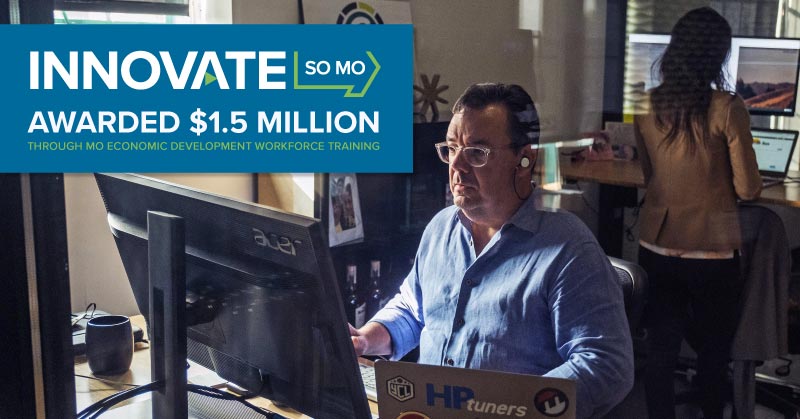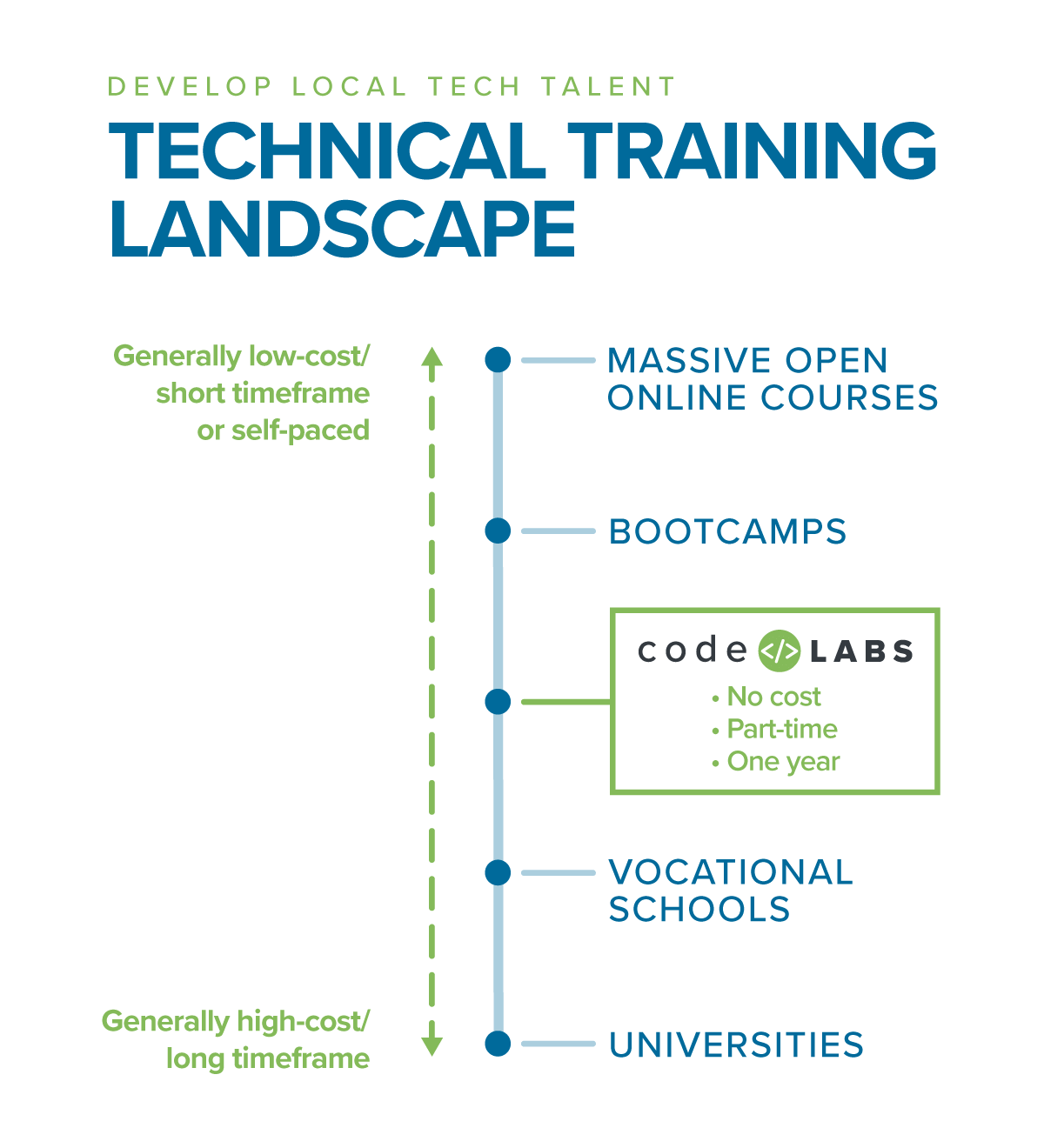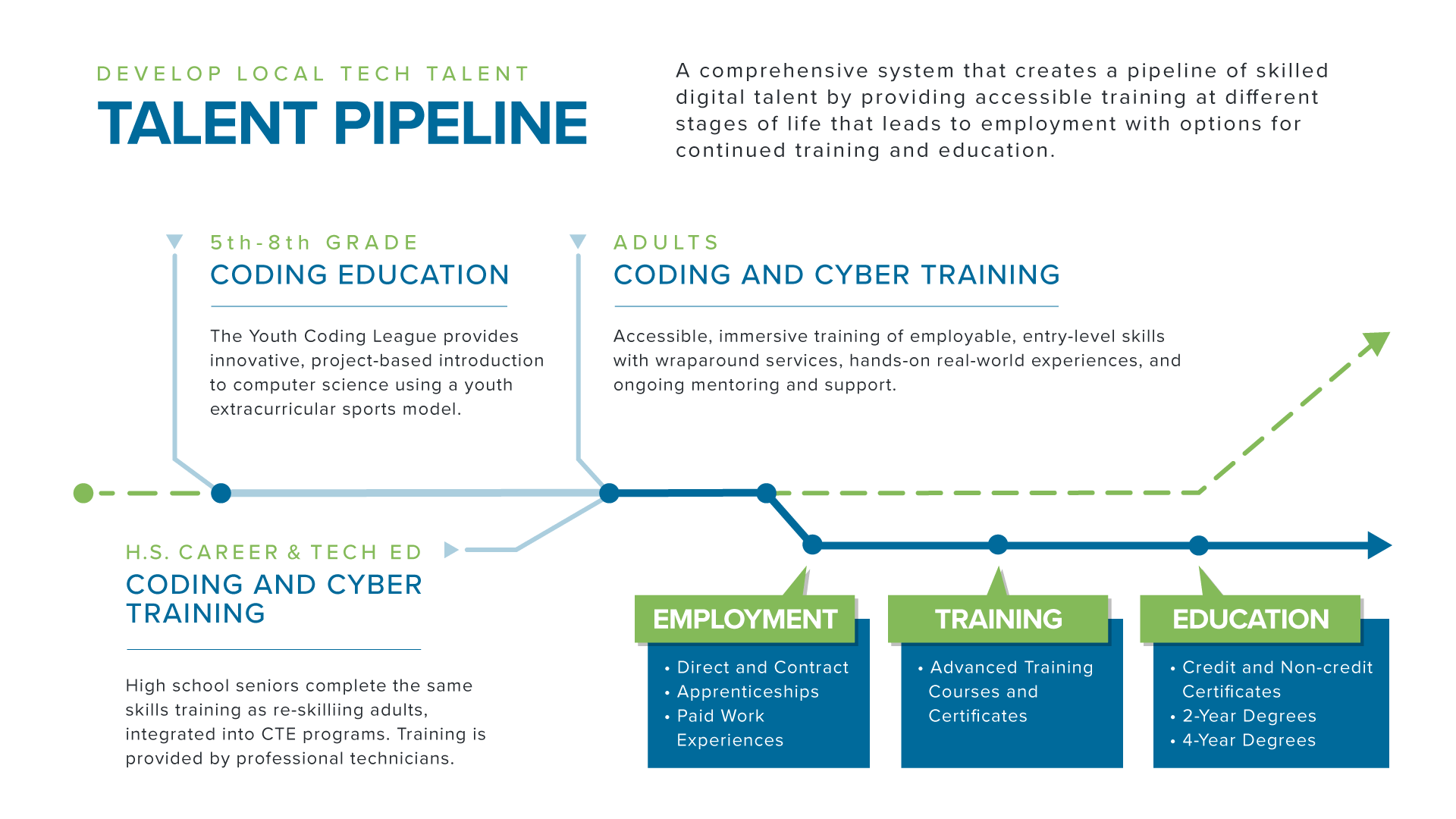
[Photo Credit: Center on Rural Innovation]
$1.5 Million Awarded to Codefi Foundation for Tech Workforce Training
January 24, 2023
We are thrilled to share that we were selected in a highly-competitive state program, being awarded $1.5 million1 through Missouri's Economic Development Workforce Training. A few months ago we were selected in another highly-competitive national program, being awarded $2 million2 to support the continued development of a regional tech-based economy. These investments are going towards the recently established Southern Missouri Innovation Network3 (Innovate SO MO), led by Codefi Foundation on Rural Innovation and the efactory4 at Missouri State University, two of the state’s most successful innovation hubs.
We will deliver multiple cohorts of Code Labs5 during the next three years of in-person and virtual training that give individuals the entry-level skills to get a job as a software developer in less than a year, at no cost to them. The project also supports cybersecurity training, adding another very in-demand skill set for employers in our region, in partnership with the Missouri Cybersecurity Center of Excellence.6
We have joined forces with some of Missouri’s best employers who are projected to hire for hundreds of new jobs over the next few years that require these skills. Vizient7 has been a key employer-partner for a few years now and has seen their tech team grow from a couple dozen to 100-plus here in Southeast Missouri. We’re also partnering with large companies such as Jack Henry,8 O’Reilly’s,9 and CoxHealth,10 to name a few.
Four years ago, our co-founder, James Stapleton, Ph.D., challenged us to Shift into High Gear.11 We took on that challenge and recently set a goal to generate $100 million in economic impact12 for our region. The support of these programs will help us achieve that goal.
We welcome more advocates, stakeholders, and employers to join. We have so much more work to do.
This is where you can stop reading if you just want to celebrate with us. Thank you for sharing your time. But we’d like to elaborate further on why this announcement, this work, is so important and how we are working towards systematically improving the trajectory of our region. So feel free to continue reading and nerd out with us.
Our Mission
When we started Code Labs six years ago13, there was a clear need for our region to increase the number of people with technical skills. Our mission has always been to provide opportunities for people who may not otherwise have access to them, to help make their life more prosperous—whether that be income or security, freedom or new opportunities, self-worth or self-actualization.
For individuals, not only do the jobs associated with these skills continue to be some of the most in-demand, fastest-growing, and high-wage occupations, a recent U.S. News and World Report14 ranked software development as the best job in America. Do we believe that everyone can become a professional coder? That’s not likely. But we want to provide accessibility to as many people as we can who have the ambition to learn. Unfortunately, there have been opportunity gaps created in our region over time, where most people have never been exposed to these occupations.
Those who have done well in our program may not be who is thought of as a stereotypical computer programmer. Success stories such as Ashley,15 Zelda,16 Bri,17 and Joseph18 give us all inspiration. There is such diversity of people that have come from all walks of life who have gone on to do great things for themselves. More than half of Code Labs participants have no college degree, over 80 percent have little to no prior coding experience, and nearly 90 percent make less than the average mean wage. So when, pre-program, $30k is the average annual income for someone, and past grads with new employment now average over $70k annually, the impact that has on an individual, their family, and their community is pretty significant.
Why Code Labs?
We view the landscape for entry into these skills to look something like this:
Massive open online courses are either free or very inexpensive options for people. While it’s often self-paced, isolated learning isn’t the most effective. Bootcamps have become wildly popular the past few years. Oftentimes the cost, usually between $15,000-30,000 for a full-time commitment for three to six months, is prohibitive for most people. We believe vocational schools can be a good environment to learn, as they stay close to practical knowledge, but there are still the same cost-prohibitors as traditional bootcamps with even longer time commitments. Universities tend to teach theoretical knowledge, and are even more cost- and time-prohibitive for most people in our region. We’re in no way saying all of these options are necessarily bad, flawed, or you shouldn’t try them. Everyone has unique circumstances and their own effective learning environments. In fact, we encourage more organizations to spring up in our region to train for these skills. The program we’ve created has distinctly been developed and iterated to meet the needs of specific individuals and employers in our region.
Code Labs is led by professional software developers. We work with local and regional tech companies to make sure practitioners are the ones teaching these skills. Participants learn using styles, methodologies, and tools that mock real-world work environments, from pair programming to learning how to deal with technical issues such as merge conflicts. It is all intended to give someone the experience that on day one of new employment, they and their new employer are confident in them being immediately productive. It is a time commitment, but we’ve organized it in a way that it can be treated as a part-time job, so participants can still “learn while they earn” to provide for their families. We then work with local employers to guide capstone projects which provide a simulated experience of what it would be like to work for a company. For the employer, it’s a chance for them to see how someone works, which increases confidence in hiring them. And we do this all while scholarshipping every person we bring into the program. No charges. Just time and effort.
If you really want to nerd out with us, the Center on Rural Innovation,19 with support from the Ascendium Education Group,20 completed a year-long analysis seeking to answer questions and identify how rural communities can foster local economic development through growth of tech-based businesses and tech employment. Code Labs was featured as the number one case study in the major research project publication.21
How We're Investing $1.5 Million
People, mostly. This funding is going to support over a dozen full- and part-time workers and tech professionals in Southern Missouri who will dedicate their time to upskilling our workforce over the next three years. Through the creation of the network for training and mentorship, individuals will get hands-on guidance learning the skills necessary to enter into a tech occupation.
From our Youth Coding League22 all the way to adults searching for new occupations, for over eight years we’ve been working on developing a local tech talent pipeline that is part of an entire startup and regional, tech-based ecosystem. This funding will give opportunity to hundreds of adults. New additions to the program will include articulation agreements with local colleges and universities that crosswalk competencies and give individuals, if they'd like, the opportunity to further their formal education with registered credentials. We recently piloted a paid work experience program and will be expanding it with local tech startups and area employers to offer additional on-the-job training.
We’ve been so very fortunate that programs such as the Youth Coding League and high school training have been made possible by generous donors. While we work diligently to make sure we use those resources virtuously, we are especially mindful when public funds are used to support programs such as this—to make sure we are the best stewards of the dollars entrusted to us. While early on we were confident there would be beneficial economic impact, we now have historical data to prove it is worthwhile to support, and the public sees a positive return on investment in a relatively short amount of time. With graduates gaining employment to new, high-wage jobs, the amount of income taxes alone will surpass the funding that’s supporting this program in less than three years. We anticipate the wages from new employment will be greater than $7 million annually, with cumulative wages since inception nearing $30 million in 2025.
The substantial aspect to these opportunities for our region is that they are often exporters, meaning the work is done here, but dollars from outside the region are brought in when goods and services are sold. Overall, it creates a more wealthy and diverse economy for our region. Those dollars are used to buy homes, goods, and services in our communities. The increase in vitality will help our region not just compete within the state, but across the nation and on a global scale into the future.
Call to Challenge
Our group works tirelessly to increase accessibility, but simultaneously has a disdain for mediocrity. While we need more effort with this type of work, we want to challenge incumbents and newcomers to question the status quo—not to disway participation, but to be critical of themselves and others in the search of doing the right work and doing things that work effectively.
We’ve unfortunately found, starting with education systems, they often have nothing at all or put up a barrier and only provide these types of opportunities to the “academically gifted.” We’re missing out on entire populations and communities of people who would thrive if they had exposure and access to these types of skills and occupations early in life. We’ve witnessed post-secondary institutions not engaging with local industry and often “teaching to test.” Competency is but a small factor of productivity and quality work. “Knowing” does not necessarily imply the ability to do. And we should make sure we don’t put up barriers that stifle innovation and growth. As children, we didn’t read books to take tests to participate in sports. Our parents put us on the field and we learned while doing. We should more closely mirror real-world experiences and not take white-glove approaches.
Likewise, apprenticeships are becoming more and more popular. At worst, certificates are required for anyone interested in even beginning these careers, and there are “apprenticeship” programs that are, in fact, just education. Education absolutely has a place in this industry and throughout society. But we want to caution regulatory bodies and organizations from viewing a credential as the golden ticket. While necessary in some edge cases, it’s not needed for a majority of the work that’s required today. A true, effective apprenticeship can be exceptionally more effective than any certificate. What pulls more weight? “I passed this art theory test?” Or, “I studied under Michelangelo?”
It can become easy to accept outcome metrics such as strictly competency tests and completion rates. But we want to challenge ourselves and all others doing this work to go further. We should continue to find ways to increase accessibility for anyone at any time throughout their life to enter the industry, and make sure we are all measuring our effectiveness by how good we are at preparing individuals with skills that make them productive citizens and employees. Together, we can codify (pun intended) a more prosperous generation for our region for years to come.
Receiving $1.5 million is a big deal. We are humbled for the opportunity, and are of course celebrating and hope you join us. There is still so much more left to do. So let’s get to work.
Relevant Links
1Governor's announcement
2Venture Challenge $2 million award
3Innovate SO MO
4efactory
5Code Labs
6MCCOE
7Vizient
8Jack Henry
9O’Reilly’s
10CoxHealth
11Shifting into High Gear
12$100 million in economic impact
13Code Labs pilot
14The ‘best job in America’
15Ashley Lovette Code Labs Success Story
16Zelda Mazur Code Labs Success Story
17Brianna Grimsley Code Labs Success Story
18Joseph Williams Code Labs Success Story
19Center on Rural Innovation
20Ascendium Education Group
21How to Increase Tech Talent and Tech Employment
22Youth Coding League

